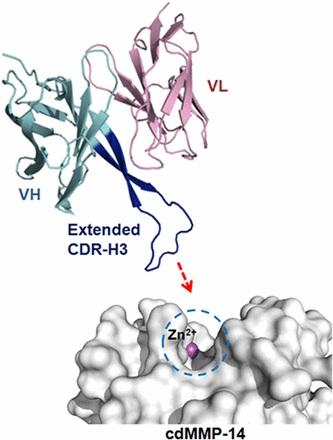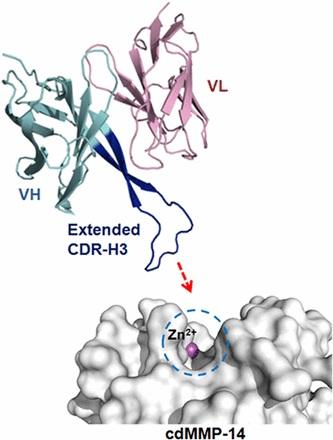
Credit: UC Riverside
RIVERSIDE, Calif. (http://www.ucr.edu) — Researchers at the University of California, Riverside have camels and llamas to thank for their development of a new cancer treatment that is highly selective in blocking the action of faulty matrix metalloproteinases (MMPs).
MMPs are a group of 26 closely related proteinases (enzymes that break down other proteins) that are essential in tissue regeneration and other normal cellular processes. However, when a tumor grows, certain MMPs are over-produced, allowing cancer cells to spread to other parts of the body.
In research published this week in the Proceedings of the National Academy of Sciences, Xin Ge, an assistant professor of chemical and environmental engineering in UCR's Bourns College of Engineering, and his colleagues describe the development of therapeutic monoclonal antibodies that are highly selective to MMPs, meaning they can bind to a specific MMP and block its activity without affecting other MMP family members. The creation of these human antibodies was inspired by antibodies found naturally in the camelid family of animals, which includes camels and llamas.
The results could lead to new treatments–not only for a variety of cancers, but also other diseases that arise from faulty proteinases, such as Alzheimer's, asthma, multiple sclerosis and arthritis.
For more than 20 years, scientists have been developing drugs that block faulty MMPs in order to stop cancers from starting and spreading. But clinical trials on a variety of promising small molecules have failed–largely because they lack the specificity needed to target faulty MMPs while still allowing "good" MMPs to perform their regular cellular duties.
"Clinical trial failures have taught us that selective, rather than broad-based, inhibitors are required for successful MMP therapies, but achieving this selectivity with small-molecule inhibitors is exceedingly difficult because of the incredible conservation among MMP family members. As a result, broad-spectrum inhibitors have failed in clinical trials due to their low overall efficacy and side effects," Ge said.
Monoclonal antibodies, with their large and inherently more specific binding sites, have been touted as an alternative to small molecules. However, until now, scientists have struggled to develop MMP-blocking antibodies due to the incompatibility between their binding sites.
"Both human antibodies and MMPs have concave–or buried–binding sites, making interactions between them almost impossible. They simply won't stick together," Ge said.
That's why the researchers turned to the convex, looped binding sites found in camel and llama antibodies that are ideal for interactions with the concave MMP sites. The team chemically synthesized billions of variants of human antibodies with convex loops found in camelids. In testing them, they identified dozens that are highly effective at blocking MMPs and reducing the spread of cancer in laboratory models.
"While we can't use camel or llama antibodies directly in humans because they would cause an immune reaction, we essentially used them as our inspiration in the creation of human antibodies that are now promising candidates against tumor-promoting MMPs," Ge said.
###
In addition to Ge, contributors to this paper included Dong Hyun Nam, a postdoctoral researcher, and Carlos Rodriguez, an undergraduate researcher, both at UC Riverside, and Albert Remacle and Alex Strongin from the Sanford Burnham Prebys Medical Discovery Institute, La Jolla, Calif. The research was supported by the National Institute of Health and a National Science Foundation Career Award to Ge.
Media Contact
Sarah Nightingale
[email protected]
951-827-4580
@UCRiverside
http://www.ucr.edu
############
Story Source: Materials provided by Scienmag





